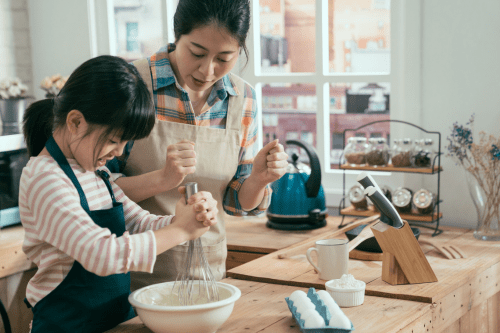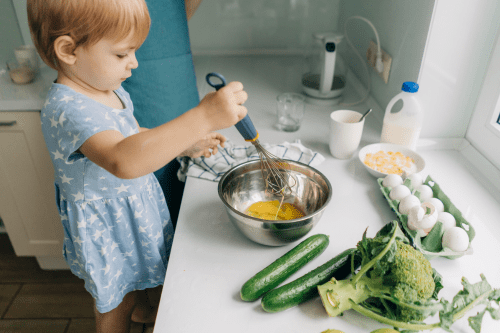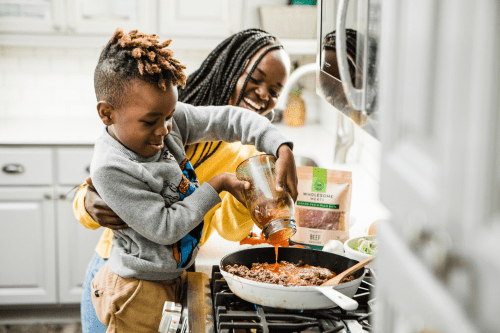Cooking is one of the best sensorial experiences for young children. It allows them to see, smell, hear, taste, and touch. Cooking also helps develop fine and gross motor skills through practical life activities such as chopping, slicing, measuring, and pouring ingredients. Several studies have even shown enhanced language and math skills for children who learn to cook from an early age. Plus, involving children in the process of creating a meal encourages healthy eating habits.
Young children likely are unaware of all of these benefits; getting involved in the kitchen just looks like fun to them. And while it might mean taking a little more time to prepare and a bit more flexibility on the adult’s part, allowing children to help out in the kitchen is so worth it! With the right expectations, this time spent together cooking with your child can create memories to last a lifetime.
Here are 8 Helpful Tips for Cooking With a Young Child:
Involve Them in the Planning Process
Ask the child to help look through the kitchen, identifying ingredients that are needed at an upcoming shopping trip. Look at a cookbook together, letting the child choose a recipe they like and add these ingredients to the shopping list. By being involved in these planning processes, young children will develop excitement for cooking.
Take Them Grocery Shopping
Invite the child to go grocery shopping with you. Ask them to help you find the items on the grocery list and let them choose a few new items they would like to try, too. This active involvement will make children more likely to want to eat the food they helped select.
Encourage and Support Their Independence
 Find a few activities that the child can do completely on their own. Washing fruits and vegetables, sprinkling cheese on a pizza, and using a cookie cutter to cut shapes into rolled dough are all great ways to encourage and support the child’s independence in the kitchen. As the child grows, their fine and gross motor skills and their attention spans continue to develop, allowing them to accept more responsibility when cooking. Progress to activities like cracking eggs, squeezing lemons, and grating cheese. Older children can even plan and cook a simple dish all on their own!
Find a few activities that the child can do completely on their own. Washing fruits and vegetables, sprinkling cheese on a pizza, and using a cookie cutter to cut shapes into rolled dough are all great ways to encourage and support the child’s independence in the kitchen. As the child grows, their fine and gross motor skills and their attention spans continue to develop, allowing them to accept more responsibility when cooking. Progress to activities like cracking eggs, squeezing lemons, and grating cheese. Older children can even plan and cook a simple dish all on their own!
Keep Things Simple
Young children can become easily distracted. Therefore, it is helpful to plan simple five to ten minute cooking activities that are fun and engaging for the child.
Model For the Child
Children often learn best by watching and then doing. Before allowing the child to try an activity on their own, model how to do it for them, allowing them to learn by watching. Use slow, deliberate movements and try to limit speech so the child can focus on each step and required movement.
Take Time to Prepare the Environment
 It is important to ensure the environment is adequately prepared to support the child’s needs. Make sure the child is able to reach the cooking surface with either the support of a stool or a learning tower. Introduce child-sized utensils including spoons, knives, and bowls, allowing the child to more easily use these items.
It is important to ensure the environment is adequately prepared to support the child’s needs. Make sure the child is able to reach the cooking surface with either the support of a stool or a learning tower. Introduce child-sized utensils including spoons, knives, and bowls, allowing the child to more easily use these items.
Involve Them in the Clean-up Process
Helping children understand the importance of cleaning up after themselves in the kitchen is equally as important as learning to cook. Model for the child how to wash and dry the dishes or load and unload the dishwasher and invite them to be involved in this part of the cooking process as well. These activities are also a great way to appeal to a child’s sensitive period for order and to develop concentration and coordination.
Allow Messes and Spills to Become Teachable Moments
Accidents happen; messes and spills are inevitable when children help out in the kitchen. Remember to remain patient and calm, using these situations as teachable moments where the child learns how to clean up after themselves and begins to understand that it is okay to make mistakes. Have towels nearby to help clean up spills when they happen. Model this process for the child and invite them to help. When the next spill happens, encourage them to use the towel to clean up the mess on their own.
The most important thing is to have fun. Cooking together will surely create memories that last a lifetime. Cherish these moments and enjoy the adventure of children in the kitchen!
Interested in writing a guest post for our blog? Let us know!
The opinions expressed in Montessori Life are those of the authors and do not necessarily represent the position of AMS.


